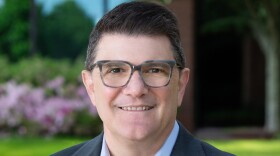With a Medicaid expansion kickoff likely delayed further in North Carolina as General Assembly budget negotiations drag on, Democratic Gov. Roy Cooper wrapped up a week of rural travel Thursday to attempt to build pressure upon Republicans to hustle on an agreement.
Cooper met with elected officials and physicians in Martin, Richmond and Yadkin counties to highlight local health care challenges, which include shuttered hospitals, rampant drug abuse and high-quality jobs.
All of these and other needs could be addressed with several billion dollars in recurring federal funds statewide annually and a one-time $1.8 billion bonus once expansion can be implemented, according to Cooper.
The governor signed a law in March that would provide Medicaid to potentially 600,000 low-income adults who make too much to qualify for traditional Medicaid. But that law said it can’t happen until a state budget law is enacted. House and Senate leaders are still negotiating a two-year spending plan seven weeks after the current fiscal year began.
“It’s past time for Republican leaders to do their jobs, pass a budget and start Medicaid expansion now to give our rural areas resources to prevent hospital closures and combat the opioid crisis,” Cooper said in a news release summarizing his visit to Yadkin County on Thursday.
With lawmakers in Raleigh this week to vote on non-budget legislation, House Speaker Tim Moore and Senate leader Phil Berger said the two chambers are getting closer to a budget agreement, but that it won't be finalized and voted on until early or mid-September.
Kody Kinsley, the secretary of Cooper's Department of Health and Human Services, announced last month that expansion would start Oct. 1 as long as his agency received formal authority by elected officials to move forward by Sept. 1. Otherwise, he said, it would have to wait until Dec. 1 or perhaps early 2024.
As the budget stalemate extended, Cooper has urged legislators unsuccessfully to decouple expansion authorization from the budget's passage and approve it separately. After completing votes Wednesday, lawmakers may not hold more floor votes until early September.
Berger and Moore said they remain committed to getting expansion implemented. Berger mentioned this week that some budget negotiations center on how to spend the one-time bonus money the state would get from Washington for carrying out expansion.
While Moore said Thursday he was hopeful expansion could still start Oct. 1, Berger reiterated that missing the Sept. 1 deadline would appear to delay it.
Cooper's travels took him Tuesday to Williamston, where he toured the grounds of Martin General Hospital, which closed two weeks ago, and later in the week to Yadkinville, where he saw the former Yadkin Valley Community Hospital, which closed in 2015.
Martin General closed its doors after its operators said it had generated financial losses of $30 million since 2016, including $13 million in 2022. Cooper was greeted in Williamston by hospital employees and other supporters who asked him for help keeping the hospital open. The closest emergency room is now 20 miles (32 kilometers) away.
North Carolina's expansion law would result in higher reimbursement rates for these and other hospitals to keep them open and give an economic boost to the region, according to Cooper's office.
Kinsley has said he expects 300,000 people who already receive family planning coverage through Medicaid will be automatically enrolled for full health care coverage once expansion begins.
And Cooper said it should also return coverage to about 9,000 people who each month are being taken off the rolls of traditional Medicaid now that eligibility reviews are required again by the federal government following the end of the COVID-19 pandemic.








